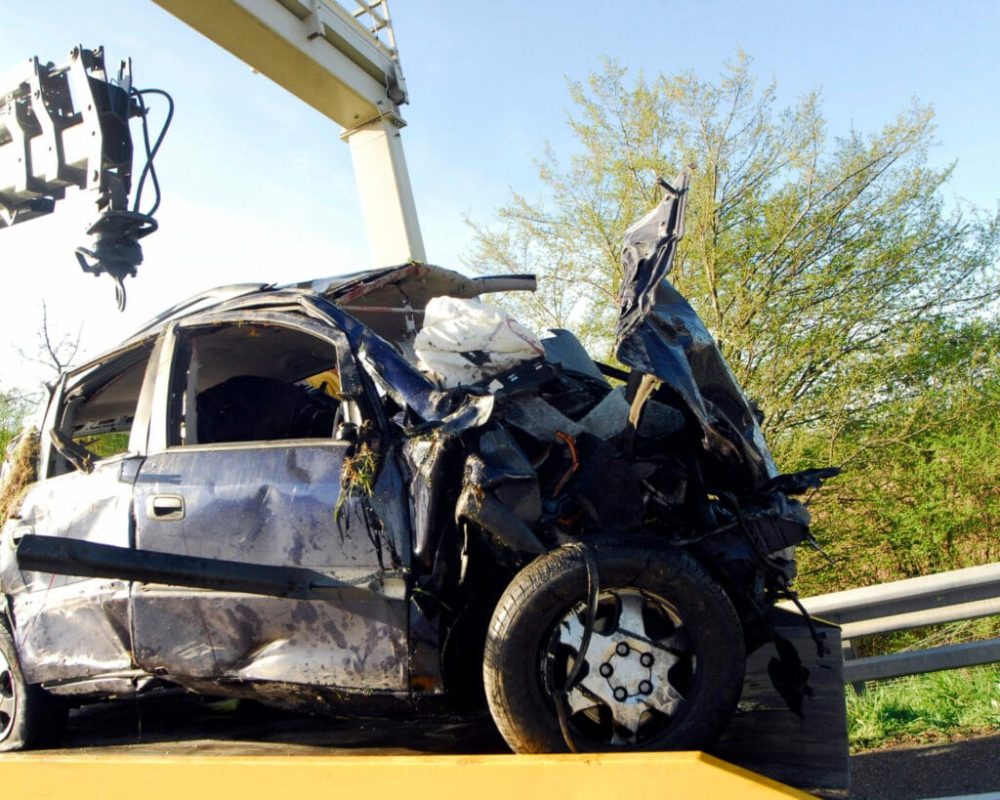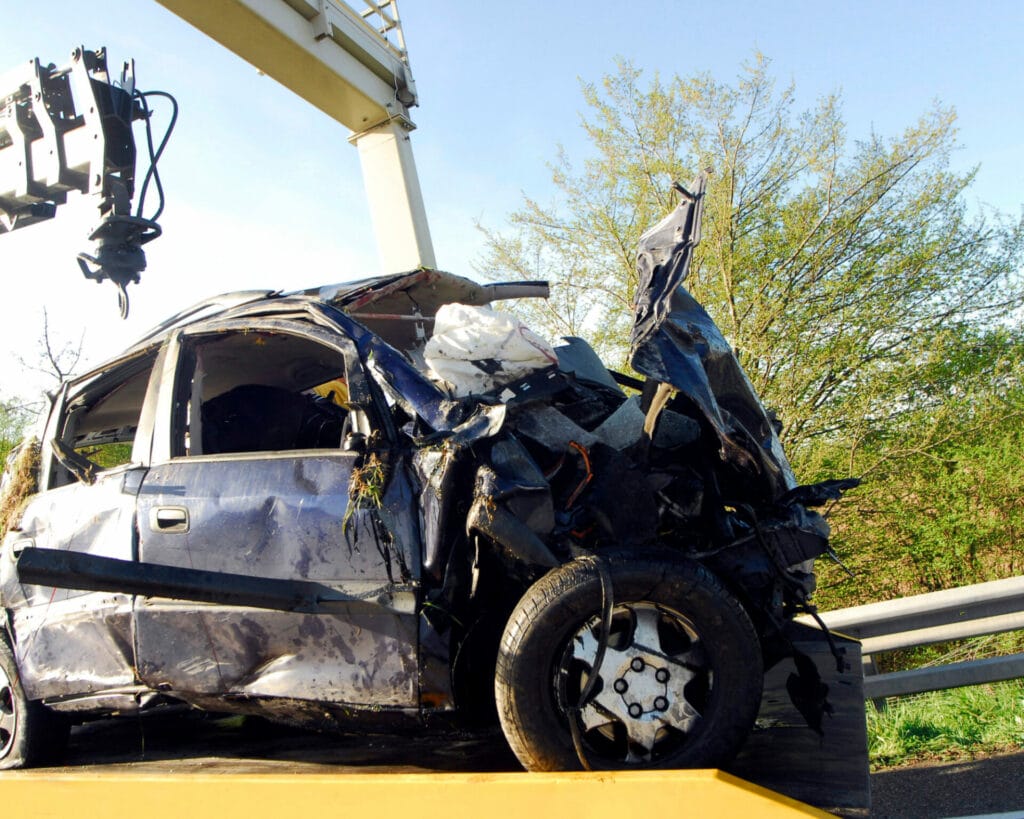
Picture this: you’re cruising down the road, the sun is shining, and life seems good. But in a split second everything changes. An unexpected accident leaves your car in shambles. It’s a heart-wrenching moment, and suddenly, you’re faced with the reality of dealing with a totaled car.
Accidents happen and when they do it’s essential to know your options. The aftermath of a car accident can be a challenging and confusing time. However, you’re not alone in navigating this process. At The Mike Hostilo Law Firm, we guide individuals through these difficult situations.
In this blog we’ll explore a crucial aspect of post-accident recovery: what to do when your car is deemed totaled. We’ll delve into the various choices available to you, shedding light on each option’s pros and cons. More importantly, we’ll explain why having an experienced attorney, like those at The Mike Hostilo Law Firm, on your side can make this challenging journey smoother and more manageable.
Before diving into your options, let’s first understand what it means for a car to be “totaled” after an accident. The coverage for the damage to your vehicle varies depending on your state’s regulations and the fault determination in the accident, whether it’s your responsibility or the other driver’s.
When you submit an insurance claim an appointed claims adjuster from your insurance provider (and potentially the other driver’s insurer) will be tasked with evaluating your case. Their primary role involves assessing the appropriate payout that their respective companies should make.
The adjuster may conclude that your car is totaled if it isn’t worth repairing or isn’t repairable at all. Insurance companies utilize their unique algorithms to arrive at this conclusion. For example, the insurance company may call your vehicle a total loss if the cost of repairing it exceeds 80% of its value.
If your car is worth $15,000 at the time of the accident, then the 80% cutoff would mean repairs likely wouldn’t be authorized if they cost more than $12,000.
If Your Car Is Deemed a Total Loss, Here Are Seven Ways You Might Consider Handling It:
Option 1: Allow the Insurance Company to Compensate You
One straightforward approach to handling a totaled vehicle following an accident could be to allow the insurance company to provide you with compensation.
Depending on the insurance laws in your state, this might involve replacing your totaled vehicle with a comparable one or offering you a cash payment that’s equivalent to your totaled vehicle’s actual cash value.
If you believe the insurance company’s offer is too low, you can challenge it. If you opt for a cash payment and still owe money on a car loan, the insurance company will generally make the check out to both you and your lender.
Once your loan has been settled, any surplus funds become your property. Nonetheless, if the insurance company’s payout falls short of your car loan balance, you will be obligated to cover the outstanding amount.
Option 2: Leave the Car As Is
In certain situations, a car that has been declared totaled may still be in a condition where it can be driven. If this is the case, you have the option to retain the vehicle and continue using it without making any repairs.
This might be something you’d consider if you don’t have collision or comprehensive coverage to pay for repairs. If you decide to keep driving a totaled vehicle, have it checked out by a mechanic first to make sure it’s safe to do so.
Option 3: Keep the Car for Parts
An alternative choice, in case your auto insurance doesn’t cover repair costs, involves retaining the vehicle for spare parts. This could be a valuable option if the brand and model of your totaled car closely match those of another vehicle you possess. If not, you could sell off spare parts that are still in good working order to other people who own the same type of vehicle.
Option 4: Sell It to a Junkyard
If you prefer to avoid the hassle of selling separate components from a wrecked vehicle, you have the option of selling it to a junkyard or salvage yard. These facilities are willing to offer you cash for your totaled car, and they might even cover the cost of having it transported away for you.
Option 5: Donate the Car
Contributing a severely damaged vehicle to a charitable organization presents another viable choice. Numerous charitable institutions are open to receiving vehicle donations, even those that have suffered significant damage, to bolster their operations.
An additional advantage of gifting a totaled vehicle to a charity is the potential eligibility for a tax deduction. If the charitable entity you offer your vehicle to sells it for an amount less than $500, you can deduct the lesser of $500 or the car’s fair market value on the day of donation. If the vehicle you donate fetches a sum surpassing $500 upon sale, you are entitled to claim the actual selling price as your deduction.
To substantiate your eligibility for this tax benefit, it’s crucial to obtain a receipt detailing the donation date and the nonprofit organization’s name.
Option 6: Trade It In
If you’re considering purchasing another vehicle, the dealership might provide the option of using your totaled car as a trade-in. It’s advisable to seek a professional assessment of your vehicle to ensure that the dealer is providing a fair trade-in value.
Option 7: Repair It Yourself
Another possible course of action when faced with a totaled car is taking on the responsibility of financing the repairs yourself. This could be a viable choice if your insurance provider refuses to cover the repair costs, yet you are determined to restore the vehicle to roadworthy condition.
When weighing whether to repair a totaled vehicle, consider whether the car can actually be fixed and made drivable again, how much repairs will cost (be sure to get more than one estimate), what the vehicle would be worth after it’s repaired, how you’ll finance the repairs, and for how long you think you’ll drive the vehicle.
Certain vehicle models may incur higher repair costs compared to others. For instance, obtaining replacement parts for an older automobile could pose greater challenges compared to more recently purchased vehicles.
But it may be worth the added expense if the car has a higher value or you want to hold on to it for sentimental reasons. If you need to take out a loan to pay for repairs, consider what kind of payments you’ll be able to afford and how much you’ll pay in interest and fees. If you think you may trade in the car two years down the line but it’ll take three years to pay off a loan, for example, it may not be worth it.
